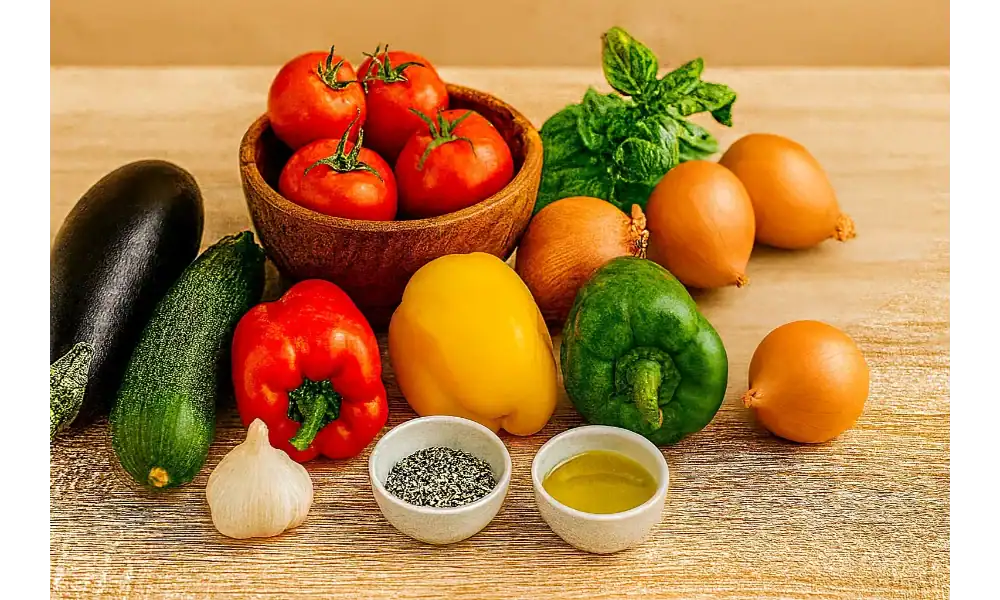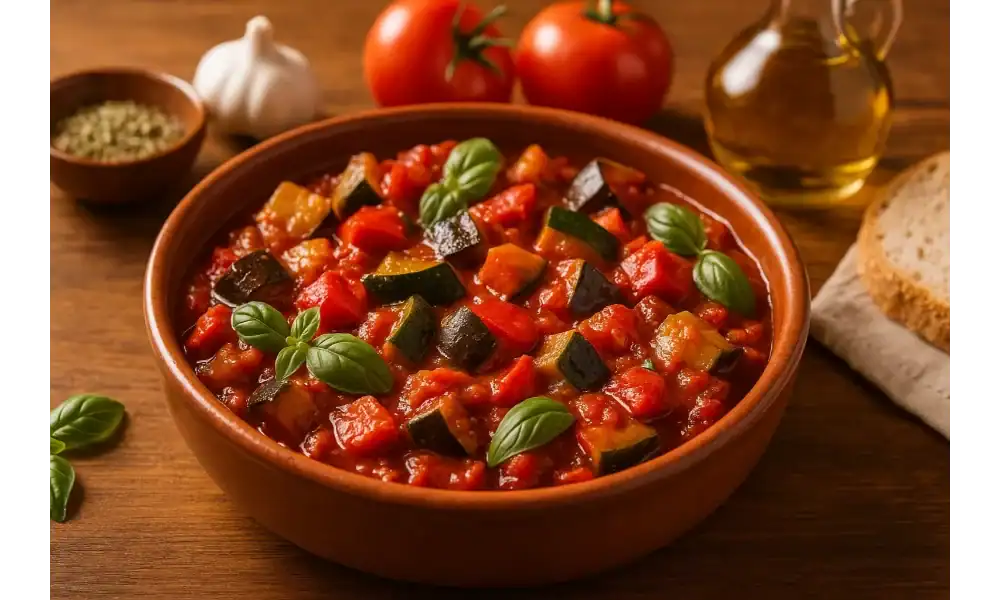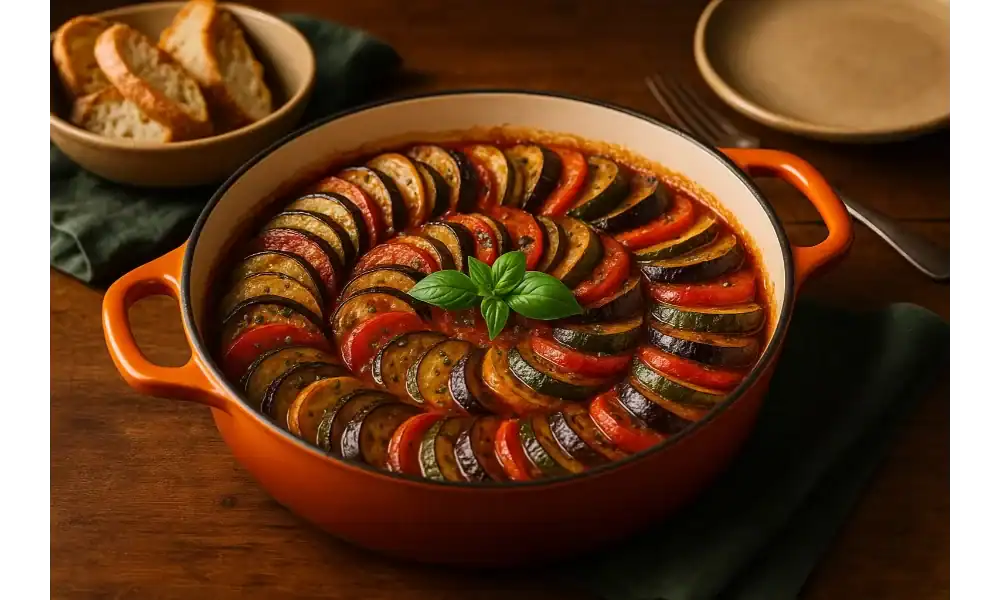Introduction
Ratatouille is a timeless French classic. It comes from Provence, a sunny region in the south of France. This dish brings together fresh vegetables like eggplant, zucchini, bell peppers, tomatoes, and onions. The flavors are rich, warm, and full of Mediterranean charm.
This authentic ratatouille recipe is healthy, vegan, and naturally gluten-free. It’s perfect for anyone who loves fresh, wholesome food. The mix of herbs, garlic, and olive oil makes every bite burst with flavor.
In this post, you will learn step-by-step how to make ratatouille like a French chef. I’ll show you how to prepare the vegetables, cook them for the best texture, and balance the flavors perfectly. Whether you serve it as a main dish or a side, this traditional French vegetable stew will become a favorite at your table.
For more eggplant-based recipes, try our:
- How to Make the Best Babaganoush at Home (Middle Eastern Eggplant Dip)
- How to Make the Best Ratatouille – Authentic Provençal Vegetable Stew
- Best Ever Baked Eggplant Parmesan – Simple Step-by-Step Guide
- How to Make the Best Mediterranean Roasted Eggplant at Home
- Gluten-Free Eggplant Parmesan Recipe – Comfort Food Made Healthy
What is Authentic Ratatouille?
The Provençal Origins of Ratatouille
Ratatouille comes from Provence in southern France. This sunny region is famous for its fresh vegetables and herbs. Farmers created this dish to use the summer harvest. It reflects the heart of Mediterranean cooking.
Key Characteristics of a Traditional Recipe
An authentic ratatouille recipe uses fresh, colorful vegetables like eggplant, zucchini, bell peppers, tomatoes, and onions. Garlic, olive oil, and herbs de Provence bring out the rich flavors. The vegetables cook slowly to blend the tastes perfectly.
Difference Between Rustic and Refined Versions
Rustic ratatouille has chunky, roughly cut vegetables and a hearty texture. Refined versions slice vegetables evenly and arrange them beautifully, like in the famous “Disney Ratatouille.” Both styles taste delicious but offer a different dining experience.
Why Fresh Seasonal Vegetables Matter
Seasonal vegetables have the best flavor and texture. They give the dish a natural sweetness and vibrant color. Fresh produce also keeps the ratatouille healthy, vegan, and full of nutrients.
Ingredients for Traditional French Ratatouille

Essential Vegetables: Eggplant, Zucchini, Bell Peppers, Tomatoes, Onions
A true authentic ratatouille recipe starts with fresh vegetables. Use firm eggplant, tender zucchini, sweet bell peppers, ripe tomatoes, and crisp onions. These ingredients give the dish its color, texture, and classic Provençal taste.
Aromatics: Garlic, Olive Oil, Fresh Basil, Herbs de Provence
Garlic adds a deep, savory flavor. Olive oil brings richness and helps the vegetables cook evenly. Fresh basil adds a sweet, herbal note, while herbs de Provence give the dish its signature Mediterranean aroma.
Optional Additions: Bay Leaves, Thyme, Parsley
You can boost the flavor with bay leaves for a subtle earthy taste. Fresh thyme adds a gentle fragrance, and parsley gives a bright, fresh finish. These herbs make the ratatouille even more aromatic.
Ingredient Selection Tips for the Best Flavor
Choose vegetables that are in season for the richest taste. Look for bright colors, firm texture, and no blemishes. Fresh herbs and good-quality olive oil make a big difference in the final flavor.
Step-by-Step Guide to Making Ratatouille
Prepping Vegetables for Even Cooking
Wash and dry all vegetables well. Cut the eggplant, zucchini, bell peppers, tomatoes, and onions into similar-sized pieces. This helps them cook evenly and keeps the authentic ratatouille texture. Use a sharp knife for clean cuts.
Sautéing Each Vegetable Separately for Rich Flavor
Heat olive oil in a large pan. Cook each type of vegetable one at a time. This prevents overcrowding and lets every piece develop deep flavor. Start with eggplant, then zucchini, followed by bell peppers, onions, and finally tomatoes.
Slow-Simmering the Stew for Tenderness
After sautéing, combine all vegetables in one pot. Add garlic, fresh basil, and herbs de Provence. Lower the heat and let the ratatouille simmer slowly. Stir gently so the vegetables keep their shape while blending flavors.
Adjusting Seasoning Like a French Chef
Taste before serving. Add sea salt, black pepper, or a drizzle of olive oil if needed. A splash of balsamic vinegar can brighten the flavor. This final step makes your authentic French ratatouille taste restaurant-quality.
Variations and Serving Ideas

Oven-Baked Ratatouille with Roasted Vegetables
For a deeper flavor, make oven-baked ratatouille. Slice the vegetables evenly. Drizzle them with olive oil, garlic, and herbs de Provence. Roast until they turn golden and tender. This method gives a rich, slightly caramelized taste.
Ratatouille as a Side Dish vs. Main Course
Serve authentic ratatouille as a colorful side dish with grilled fish or roasted chicken. Or make it the star by pairing it with quinoa, couscous, or polenta. Both ways keep the dish healthy, vegan-friendly, and satisfying.
Pairing with Crusty Bread, Pasta, or Rice
Warm crusty bread soaks up the flavorful sauce. For a hearty meal, serve ratatouille over pasta or rice. The vegetables blend perfectly with these simple sides, making every bite more comforting.
Chilled Ratatouille as a Summer Appetizer
Let the ratatouille cool and serve it chilled in small bowls. Add fresh basil for a burst of flavor. This light version is perfect for hot summer days and outdoor gatherings.
Tips for Perfect Ratatouille Every Time
How to Prevent Soggy Vegetables
Cut vegetables into even pieces and cook them in small batches. High heat helps them keep their shape. Avoid adding too much liquid, and let any extra moisture evaporate before mixing.
Balancing Flavors with Acidity and Sweetness
Taste your ratatouille before serving. Add a splash of balsamic vinegar or lemon juice for brightness. Use ripe tomatoes or a pinch of sugar to balance acidity. This keeps the authentic ratatouille flavor well-rounded.
Storage and Reheating Tips
Store leftover ratatouille in an airtight container in the fridge. It stays fresh for up to four days. Reheat gently on low heat or in the oven to keep the vegetables tender.
Making Ratatouille Ahead for Deeper Flavor
Prepare the dish a day in advance if you can. Letting the flavors rest overnight makes them richer. Serve it warm or chilled for a delicious make-ahead French vegetable stew.
Authentic French Ratatouille Recipe

Authentic French Ratatouille Recipe
Ingredients
Method
- Heat 2 tbsp olive oil in a large pan over medium heat. Sauté the eggplant for 5–6 minutes until slightly softened. Remove and set aside.
- Add 1 tbsp olive oil, cook zucchini for 3–4 minutes. Remove and set aside.
- Add the remaining olive oil, sauté bell peppers for 4–5 minutes. Remove and set aside.
- In the same pan, cook onion for 3 minutes, then add garlic and cook for 1 minute.
- Add chopped tomatoes and herbs de Provence. Simmer for 5 minutes.
- Return all vegetables to the pan. Season with salt and pepper. Stir gently.
- Cover and simmer on low heat for 15–20 minutes until vegetables are tender.
- Garnish with fresh basil and serve warm.
FAQs
1. What is authentic ratatouille?
Authentic ratatouille is a traditional French vegetable stew from Provence. It combines eggplant, zucchini, bell peppers, tomatoes, onions, garlic, olive oil, and herbs de Provence.
2. Can I make ratatouille without eggplant?
Yes. You can replace eggplant with extra zucchini or bell peppers. The flavor will be slightly different, but still delicious.
3. Is ratatouille served hot or cold?
You can serve ratatouille hot, warm, or chilled. Hot versions are comforting in winter, while chilled versions are refreshing in summer.
4. How long does homemade ratatouille last in the fridge?
Store it in an airtight container for up to four days. The flavors often improve after a day.
5. Can I freeze ratatouille?
Yes. Let it cool completely, place it in freezer-safe containers, and freeze for up to three months. Thaw overnight and reheat gently.
Conclusion
Making authentic ratatouille is simple when you follow a few key steps. Choose fresh seasonal vegetables, cook them with care, and balance the flavors with herbs and a touch of acidity. This keeps the dish vibrant, healthy, and true to its Provençal roots.
Feel free to add your own twist. You can try new herbs, serve it with different sides, or adjust the texture to your taste. Ratatouille is flexible and works well in many styles.
I’d love to hear how your ratatouille turns out. Share your version in the comments so we can inspire each other with new ideas.
Enjoy this comforting French vegetable stew at home. It’s fresh, colorful, and perfect for sharing with family or friends. Once you try it, you’ll understand why ratatouille is a timeless French classic.
For more recipes, try our:
- 25 Best Smoothie Bowl Toppings to Elevate Your Breakfast
- How to Make the Perfect Smoothie Bowl at Home (Easy & Healthy)
- How to Make the Best Homemade Cornbread: Easy & Delicious Recipe
- How to Make the Best Crabcakes: Crispy, Juicy & Full of Flavor
- The Best Chicago Pizza Recipe – Deep, Cheesy, and Full of Flavor


1 thought on “How to Make Authentic Ratatouille Like a French Chef”